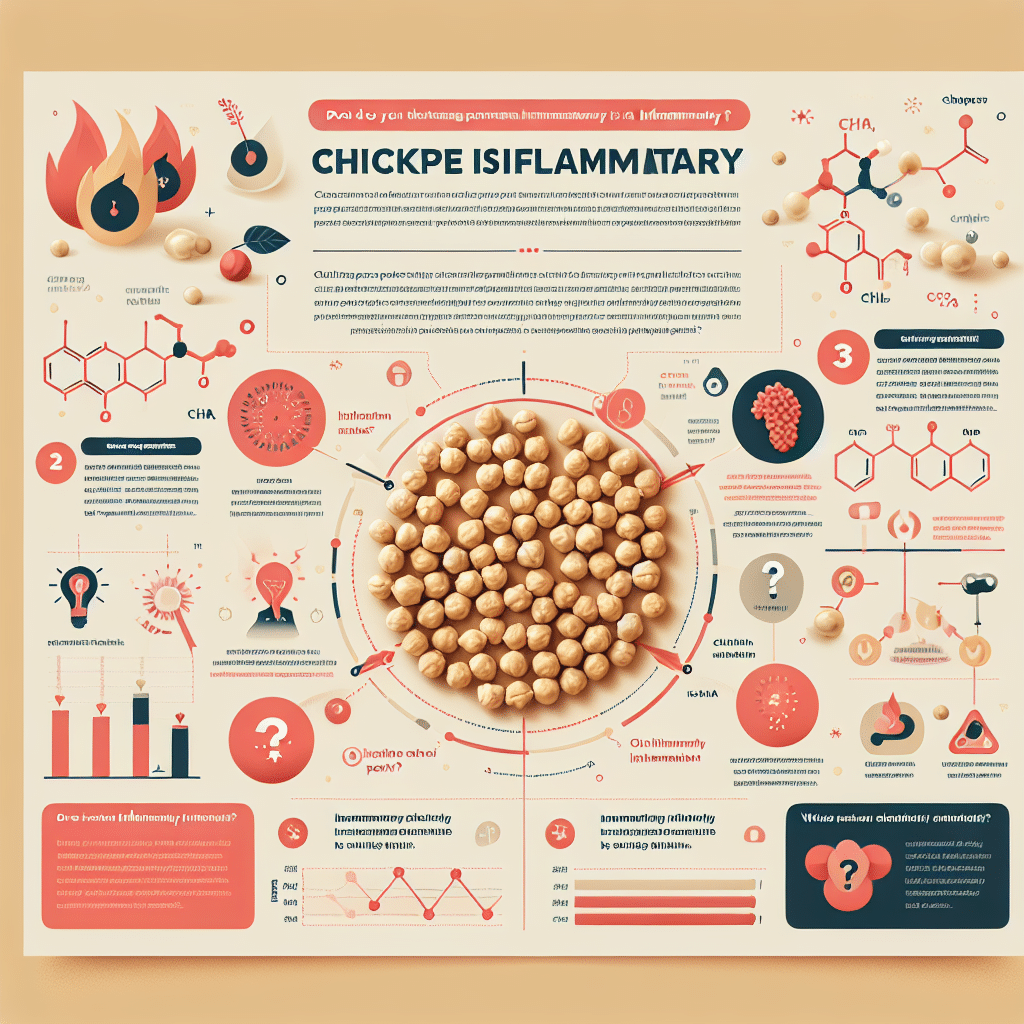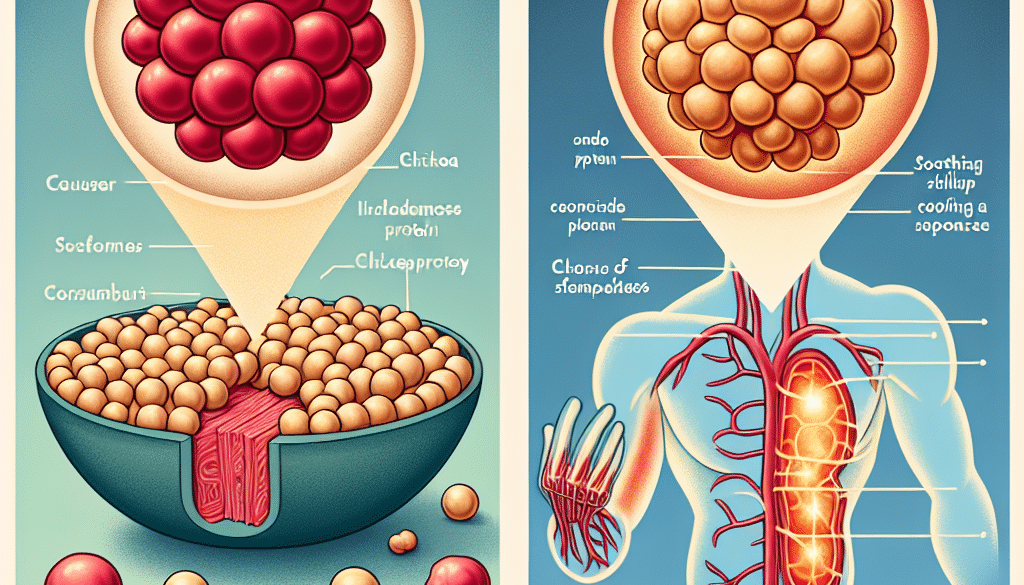Is Chickpea Protein Inflammatory?
-
Table of Contents
- Chickpea Protein: An In-Depth Look at Its Inflammatory Properties
- Understanding Inflammation and Diet
- The Nutritional Profile of Chickpeas
- Is Chickpea Protein Inflammatory?
- Scientific Research on Chickpeas and Inflammation
- Case Studies and Examples
- Anti-Inflammatory Compounds in Chickpeas
- Chickpea Protein in a Balanced Diet
- How to Include Chickpea Protein in Your Diet
- Conclusion: The Anti-Inflammatory Benefits of Chickpea Protein
- Discover ETprotein’s High-Quality Chickpea Protein Products
Chickpea Protein: An In-Depth Look at Its Inflammatory Properties

Chickpeas, also known as garbanzo beans, are a staple in many diets around the world. They are not only a rich source of protein but also contain a variety of nutrients that contribute to overall health. With the rise of plant-based diets, chickpea protein has become an increasingly popular alternative to animal proteins. However, there is a growing concern among health-conscious individuals and researchers about the inflammatory properties of different foods, including proteins. This article delves into whether chickpea protein is inflammatory, examining the evidence from scientific research and nutritional perspectives.
Understanding Inflammation and Diet
Inflammation is a natural process that occurs in the body as a response to injury or infection. While acute inflammation is beneficial for healing, chronic inflammation can lead to various health issues, including heart disease, diabetes, and arthritis. Diet plays a crucial role in managing inflammation, with certain foods known to exacerbate it, while others may have anti-inflammatory effects.
The Nutritional Profile of Chickpeas
Chickpeas are a nutrient-dense food, providing a rich source of protein, dietary fiber, vitamins, and minerals. They contain key nutrients such as folate, iron, phosphorus, and B vitamins. The protein in chickpeas is considered high quality for a plant-based source, as it contains essential amino acids necessary for human health.
- Protein Content: Chickpeas contain about 15 grams of protein per cup.
- Dietary Fiber: They are also high in fiber, which is beneficial for digestive health.
- Vitamins and Minerals: Chickpeas are a good source of vitamins and minerals that support various bodily functions.
Is Chickpea Protein Inflammatory?
When it comes to inflammation, not all proteins are created equal. Animal-based proteins, particularly red and processed meats, have been associated with increased levels of inflammation. In contrast, plant-based proteins like chickpeas are often considered to have anti-inflammatory properties.
Scientific Research on Chickpeas and Inflammation
Several studies have investigated the effects of chickpea consumption on inflammation. A common finding is that chickpeas and other legumes have anti-inflammatory effects due to their high fiber content and the presence of antioxidants and phytonutrients. These components can help reduce oxidative stress and lower the risk of chronic diseases.
Case Studies and Examples
One study published in the “American Journal of Clinical Nutrition” found that a diet rich in legumes, including chickpeas, reduced markers of inflammation in participants. Another study in the “Journal of Food Science and Technology” highlighted that chickpea consumption could improve serum lipid profiles and reduce the risk of cardiovascular diseases.
Anti-Inflammatory Compounds in Chickpeas
Chickpeas contain several compounds that contribute to their potential anti-inflammatory effects:
- Saponins: These compounds have been shown to possess anti-inflammatory properties.
- Flavonoids: A type of antioxidant that helps combat oxidative stress.
- Phytic Acid: While often considered an anti-nutrient, phytic acid also has antioxidant effects.
Chickpea Protein in a Balanced Diet
Incorporating chickpea protein into a balanced diet can offer numerous health benefits. It can serve as an excellent protein source for vegetarians and vegans, and its potential anti-inflammatory properties make it a valuable addition for those looking to reduce inflammation through diet.
How to Include Chickpea Protein in Your Diet
Chickpea protein can be consumed in various forms, such as whole chickpeas, chickpea flour, or as an ingredient in plant-based protein powders. Here are some ways to include it in your diet:
- Adding chickpeas to salads, soups, and stews.
- Using chickpea flour in baking or as a thickener.
- Incorporating chickpea-based products like hummus into snacks and meals.
Conclusion: The Anti-Inflammatory Benefits of Chickpea Protein
In conclusion, chickpea protein appears to be more anti-inflammatory than inflammatory, especially when compared to certain animal proteins. Its rich nutritional profile, including antioxidants and fiber, contributes to its potential health benefits. While more research is needed to fully understand the relationship between chickpea protein and inflammation, current evidence suggests that it can be a valuable part of an anti-inflammatory diet.
Discover ETprotein’s High-Quality Chickpea Protein Products
If you’re looking to incorporate chickpea protein into your diet, ETprotein offers a range of high-quality protein products that can meet your needs. Their organic chickpea protein is non-GMO, allergen-free, and characterized by a neutral taste, making it an excellent choice for various applications.
ETprotein’s commitment to quality ensures that you receive the best plant-based proteins to support your health and dietary preferences. Whether you’re a manufacturer, trader, or simply someone looking to improve your protein intake, ETprotein has the right product for you.
About ETprotein:
ETprotein, a reputable protein and L-(+)-Ergothioneine (EGT) Chinese factory manufacturer and supplier, is renowned for producing, stocking, exporting, and delivering the highest quality organic bulk vegan proteins and L-(+)-Ergothioneine. They include Organic rice protein, clear rice protein, pea protein, clear pea protein, watermelon seed protein, pumpkin seed protein, sunflower seed protein, mung bean protein, peanut protein, and L-(+)-Ergothioneine EGT Pharmaceutical grade, L-(+)-Ergothioneine EGT food grade, L-(+)-Ergothioneine EGT cosmetic grade, L-(+)-Ergothioneine EGT reference grade and L-(+)-Ergothioneine EGT standard. Their offerings, characterized by a neutral taste, non-GMO, allergen-free attributes, with L-(+)-Ergothioneine purity over 98%, 99%, cater to a diverse range of industries. They serve nutraceutical, pharmaceutical, cosmeceutical, veterinary, as well as food and beverage finished product distributors, traders, and manufacturers across Europe, USA, Canada, Australia, Thailand, Japan, Korea, Brazil, and Chile, among others.
ETprotein specialization includes exporting and delivering tailor-made protein powder and finished nutritional supplements. Their extensive product range covers sectors like Food and Beverage, Sports Nutrition, Weight Management, Dietary Supplements, Health and Wellness Products, and Infant Formula, ensuring comprehensive solutions to meet all your protein needs.
As a trusted company by leading global food and beverage brands and Fortune 500 companies, ETprotein reinforces China’s reputation in the global arena. For more information or to sample their products, please contact them and email sales(at)ETprotein.com today.














